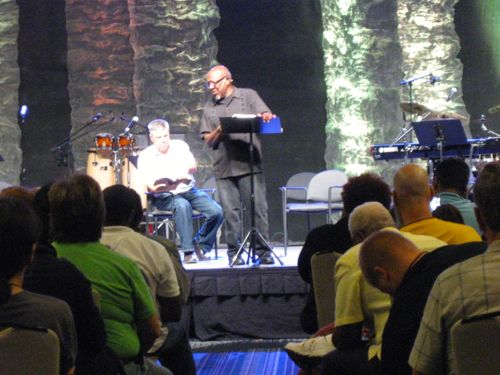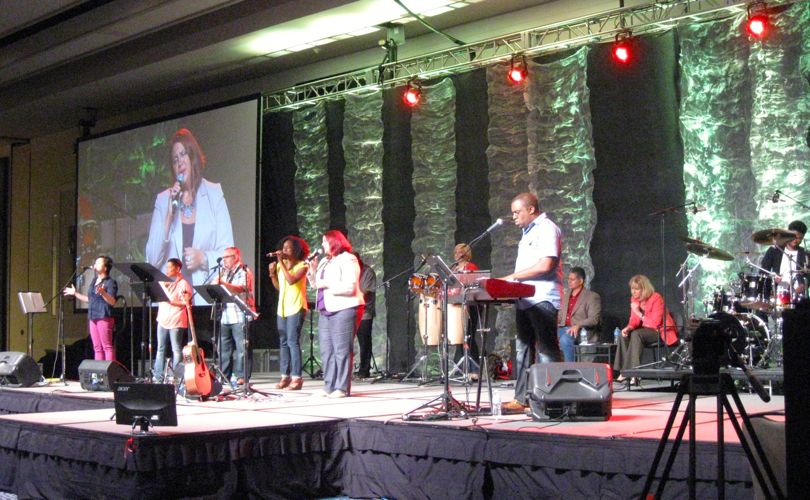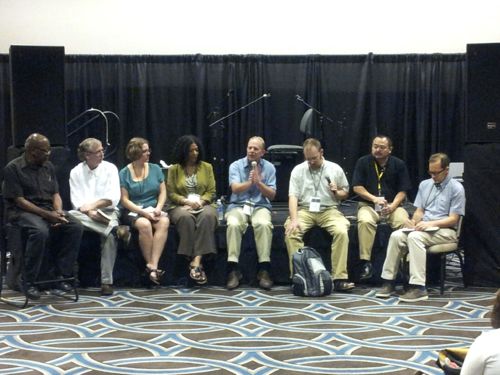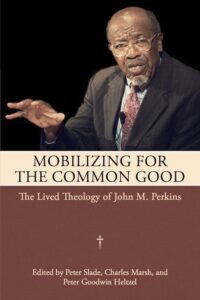This is the first of a series of blog posts with reports and reflections by Peter Slade on his two-week lived theology road trip from New Orleans to Memphis in September 2013.

I flew to new Orleans to attend the annual conference of the Christian Community Development Association (CCDA). The CCDA is a network of churches and ministries working in the impoverished, mostly urban, neighborhoods– the so-called “forgotten places of empire.” Its guiding principles are crystallized in John Perkins’s three Rs of Relocation, Redistribution and Reconciliation. I was one of around nearly 3,000 who arrived in the city for what Charles Marsh has described as “a mix of mass meeting, Billy Graham crusade, and SNCC planning session circa 1963” (The Beloved Community, 2005, 185).
It is certainly an odd event.

John Perkins leading the morning Bible study.
As I arrived at the Hyatt Regency on the Wednesday evening it had the trappings of many of the conferences I have attended–modern conference hotel, name tags on lanyards, exhibition hall, meeting rooms and workshops–but the motley mass of humanity crowding in through the front doors seemed to confound the hotel staff. It is hard to describe the attendees of CCDA. They are certainly racially diverse–African American, Latino, Asian, and Anglo–but this isn’t the kind of racial diversity usually found in the powerful white world of professional conferences. CCDA is ethnically, economically and culturally diverse: this is not the kind of diversity where all are welcome at the table just as long as they eat from the white menu and observe white etiquette.
Founded in 1989 by John Perkins and Wayne Gordon, this is the twenty-fifth annual conference and there are obvious efforts in place to keep the organization moving forward. I detected a lack of concern to keep within acceptable limits of white evangelical orthodoxy. I also saw the way CCDA is moving beyond the black/white paradigm of racial reconciliation that dominated the 1990s for evangelicals.
At the forefront of these changes is Soong-Chan Rah, a professor of church growth and evangelism at North Park Theological Seminary in Chicago. Rah appeared on the main stage and took part in numerous workshops. He brings insights of post-colonial studies to bear on the domestic urban ministries of CCDA. The plenary session on my second morning in New Orleans was on “indigenous leadership.” Rah chose this moment to critique one of the three pillars of CCDA. He explained that the misunderstanding or misapplication of the R of Relocation has significantly hampered CCDA’s development of local leaders. White suburban Christians misappropriate the Philippian hymn when they understand themselves as emptying themselves of power and moving to the neighborhood to conduct an incarnational ministry to save the poor, Rah explained. They are not Christ, Rah tells the hall, only the Church–the community–can now be the incarnate body of Christ.

Dominating the conference was the issue of mass incarceration in America. On the Friday morning the main hall was full to hear Michelle Alexander–author of the The New Jim Crow: Mass Incarceration in the Age of Colorblindness. It was the modern equivalent of Finney’s abolitionist revival meetings. Before Alexander took the stage, the praise team led the congregation in contemporary Christian praise songs drenched in a realized eschatology. “Spirit break out, heaven come down . . . We want to see your kingdom here.” Alexander called for an end to the “prison industrial complex profiting from black bodies,” in which black men are “shuttled from decrepit schools to hi-tech prison facilities.” This system rests on the core belief that “some are not worthy of care and concern.” She challenged America to move beyond the War on Drugs that has so disastrously crippled whole communities in the United States. “War has failed. It is time to chose another path. . . A great awakening is required!”

(L. to R.) John Perkins, Ted Ownby, Kelly Figueroa-Ray, Lisa Sharon Harper, Michael Andres, Peter Slade, Soong-Chan Rah, Charles Marsh
What brought me to CCDA this year was the launch of Mobilizing for the Common Good: The Lived Theology of John M Perkins. I was pleased to see a large pile of copies on the book table next to The New Jim Crow. A number of the contributors were present at CCDA and we held a panel presentation on the Friday lunchtime. John Perkins turned up to hear what we had to say about him and we invited him to join us.
—
I have a second reason for this road trip and that is conducting research into my book project on congregational singing as a practice of reconciling communities. While at CCDA I caught up with David Bailey, a worship leader from Richmond, Virginia. He was leading the worship at the plenary sessions and also conducting workshops (“Melody and Memory: Reconciliation through Worship Music” and “Worship and Mission Contextualization for the Urban Context.” For Bailey, worship music is invaluable in its role of “connecting the heart and the mind.”
I left New Orleans in the middle of a dramatic electrical storm and took I-55 toward Jackson, Mississippi. Jackson is the home of John Perkins as well as Redeemer Church. Redeemer is a multi-ethnic church that I want to get to know better as I explore the challenges facing congregations trying to find the songs that connect the heart and mind of a congregation bent on reconciliation.
 Lately, we’ve been posting a lot about John Perkins and the new PLT book about his life and work, Mobilizing for the Common Good: The Lived Theology of John M. Perkins. If you missed it, you can catch up on the CCDA conference and book launch news, or read Pete Slade’s blogs about the CCDA launch and an additional book event at the Old Capitol in Jackson, Mississippi.
Lately, we’ve been posting a lot about John Perkins and the new PLT book about his life and work, Mobilizing for the Common Good: The Lived Theology of John M. Perkins. If you missed it, you can catch up on the CCDA conference and book launch news, or read Pete Slade’s blogs about the CCDA launch and an additional book event at the Old Capitol in Jackson, Mississippi.



